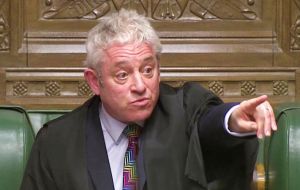MercoPress. South Atlantic News Agency
Road map for Brexit “indicative” votes this Wednesday
 The architect of the amendment, Tory former minister Sir Oliver Letwin said he hoped to be able to work with both the Government and the Labour frontbenches
The architect of the amendment, Tory former minister Sir Oliver Letwin said he hoped to be able to work with both the Government and the Labour frontbenches  If more than one business motion is tabled, it will be up to the Speaker John Bercow to decide which one is selected.
If more than one business motion is tabled, it will be up to the Speaker John Bercow to decide which one is selected. MPs in the House of Commons have voted for an amendment enabling them to take control of Commons business and stage a series of “indicative” votes on the way forward for Brexit.
– How will that work? At 2pm on Wednesday, normal proceedings in the House will stop and MPs will then consider a backbench motion setting out the future Commons business, including the arrangements for staging indicative votes on the various options but forward. If more than one business motion is tabled, it will be up to the Speaker John Bercow to decide which one is selected.
The architect of the amendment, Tory former minister Sir Oliver Letwin said he hoped to be able to work with both the Government and the Labour frontbenches in coming to an agreement on how it should actually work. After a debate lasting up to an hour, the Commons will then start to consider the various propositions that are put forward.
– How long will that take? It’s not clear, although Sir Oliver suggested it could be quite a lengthy process covering several sitting days, as the House whittles down the various options to one which can command a Commons majority.
He proposed they begin on a “plain vanilla basis” with MPs casting their votes on the various propositions on paper slips at the end of the first debate rather than going through the lobbies in a series of divisions which is the normal practice.
He said that should stop MPs trying to “game” the outcome based on the sequence in which the votes are called. Once they have established which of the proposals have “significant” support, he said a way would have to be found – possibly through some form of preferential voting system – to “zero in” on the one around which a majority of MPs could coalesce.
– Which options are likely to be considered? It will be up to the Speaker, but Sir Oliver said he believed all “serious” proposals that were put forward should have a chance to be debated. At one end of the spectrum that could include a second referendum or revoking the Article 50 withdrawal process altogether. At the other it could include a no-deal Brexit, leaving the EU on World Trade Organization terms.
In between, there could be proposals for a “softer” Norway-style Brexit – sometimes called Common Market 2.0 – the customs union plan favoured by Labour, and a “harder” Canada-style free trade deal.
– What is the UK Government’s response? Ministers have warned it sets a “dangerous, unpredictable precedent” while Theresa May has said she will not necessarily be bound by the results – particularly if they are “undeliverable” by the EU.
That prompted Tory former minister Nick Boles to warn that MPs could bring forward legislation forcing the Government to act if ministers try to ignore the wishes of Parliament.
– How long have they got to sort this out? The clock is ticking. Last week the EU gave Mrs. May until April 12 to come forward with an alternative plan if she cannot finally get her twice-rejected Brexit deal through the Commons in a “meaningful vote” this week.




Top Comments
Disclaimer & comment rulesCommenting for this story is now closed.
If you have a Facebook account, become a fan and comment on our Facebook Page!